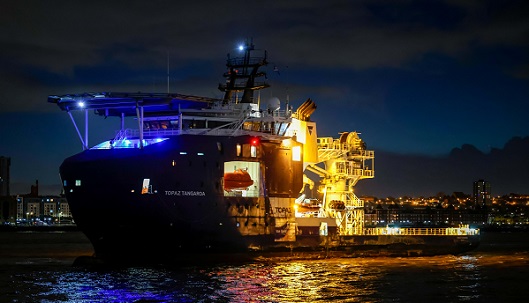
The Royal Fleet Auxiliary (RFA) will introduce drastically shorter tours of duty onboard two ships brought in to support Ministry of Defence (MOD) outputs.
RFA personnel will deploy on a dual crewing model for approximately 36 days on, 36 days off, compared with a typical four-month deepsea deployment.
Fewer RFA crew will be onboard the vessels too, with approximately 24-26 RFA personnel alongside 60-70 Royal Navy specialists and civilian contractors to operate the undersea surveillance systems and other survey and warfare systems.
The RFA Stirling Castle mine hunting counter measures and operational support vessel (MHC) and the as yet unnamed multi role ocean surveillance ship (MROSS), are physically smaller than existing vessels in the RFA fleet.
Nautilus national organiser Steve Doran said: ‘The introduction of two ships is welcome news, and Nautilus will continue full engagement in pursuance of best possible terms and conditions moving forward for our members.’
RFA Stirling Castle is currently in Devonport with an RFA crew on board preparing to transition into service in the summer.
RFA personnel will move onboard MROSS over the next couple of weeks. Known as the Topaz Tangaroa, it is a three-year-old, 98-metre-long, offshore patrol vessel, and is expected to come into service early autumn.
‘These are really exciting ships that the RFA has been entrusted to operate on behalf of the nation and bring all sorts of opportunities for our workforce,’ RFA Commodore David Eagles told Nautilus.
‘The vessels have new capabilities for the RFA such as working on the seabed, which is a completely new skill we're going to have to learn. So, we're putting training courses in place and I'm bringing in a very small number of experts from industry who will act as coaching mentors to our people, both on the bridge and on the deck, to make sure we're safe and effective and our people are appropriately developed and grown into the new roles that we're taking on.’
Additional training on Dynamic Positioning Systems and seabed operations will be offered as standard to crew deployed on these vessels.
Full naming ceremonies and a service of dedication for both ships will be held in the summer.
Following many years of disinvestment in the RFA, it now has a pipeline of ships coming into service over the next 10 years including three new fleet solid support ships recently signed off by the Secretary of State for Defence Ben Wallace.
The RFA will need to grow by about 400 civilian seafarers over the next decade, taking its current workforce from approximately 1,800 to 2,200.
Tags
More articles
Nautilus podcast Off course: Episode 4 – rising through the ranks featuring Captain Susan Cloggie-Holden
Episode 4 of Nautilus podcast series Off course: a sideways look at life at sea, features first female master of the Royal Fleet Auxiliary (RFA), Captain Susan Cloggie-Holden.
Union flags doubts over RFA ship design
Nautilus has made representations to the Royal Fleet Auxiliary (RFA) expressing members’ concerns about the military-style design for its three newbuild Fleet Solid Support ships.
Opt-in to Herald inclusivity at RFA
Nautilus members working for the Royal Fleet Auxiliary (RFA) can now opt into a new inclusivity group, Herald, which will work to champion change across the service.
